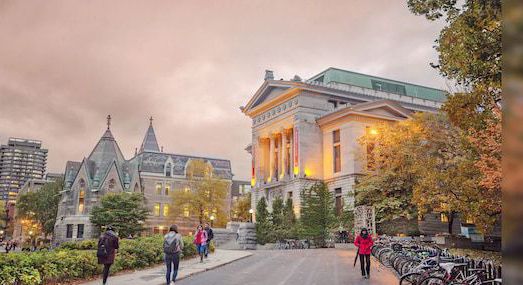EDUCATION
Study in Canada: Top-Ranked Universities, Popular Courses, and Application Requirements
Study in Canada: Top-Ranked Universities, Popular Courses, and Application Requirements
Canada remains one of the most attractive destinations for international students—especially those from India—thanks to its multicultural society, high-quality education system, and globally ranked universities. Institutions like McGill University, University of Toronto, and the University of British Columbia consistently draw thousands of applicants every year.

Aside from academic excellence, Canada offers students access to work opportunities, a strong focus on research, and pathways for post-study immigration. However, to study in the country, students must gain admission to a Designated Learning Institution (DLI)—an approved school, college, or university authorized by the government.
Top Universities in Canada and Their Popular Courses
1. University of Toronto
Ranked among the top two universities in Canada, the University of Toronto leads in various academic disciplines. According to the QS World University Rankings 2026, the university offers 151 undergraduate and graduate programs, maintaining strong global positions in the following areas:
- Arts and Humanities – Ranked 14th globally
- Engineering and Technology – 17th
- Life Sciences and Medicine – 13th
- Natural Sciences – 20th
- Social Sciences and Management – 14th
2. University of British Columbia (UBC)
UBC holds the third spot nationally and ranks 40th worldwide. The university is known for its strong academic diversity and offers 255 undergraduate programs and 236 postgraduate courses.
Here’s how UBC performs in different subject areas:
- Arts and Humanities – 19th globally
- Engineering and Technology – 31st
- Life Sciences and Medicine – 25th
- Natural Sciences – 22nd
- Social Sciences and Management – 20th
3. McGill University
Regarded as the top university in Canada, McGill ranks 27th in the world and provides a whopping 498 programs across undergraduate and postgraduate levels.
Its subject-wise global rankings include:
- Arts and Humanities – 36th
- Engineering and Technology – 45th
- Life Sciences and Medicine – 27th
- Natural Sciences – 48th
- Social Sciences and Management – 39th
Eligibility and Admission Requirements
Before applying for a Canadian study permit, students must receive an acceptance letter from a Designated Learning Institution (DLI). Here’s what is typically required:
- Proof of Admission: An official offer letter from a DLI.
- Financial Documents: Evidence of sufficient funds to cover tuition, living expenses, and return travel.
- Intent to Leave After Studies: Applicants must show that they plan to leave Canada upon completion of their studies.
- Medical Examination: Some students may be required to undergo a medical check-up depending on the country of residence.
Post-Graduation Opportunities
After completing their studies, graduates can apply for a Post-Graduation Work Permit (PGWP). The length and eligibility for this permit depend on the duration and type of academic program. A PGWP allows students to gain valuable Canadian work experience, which may also support permanent residency applications in the future.
Discover more from 9jaPolyTv
Subscribe to get the latest posts sent to your email.

 ARTICLES23 hours ago
ARTICLES23 hours agoIs Dialysis the Only Option for Kidney Failure?

 ARTICLES23 hours ago
ARTICLES23 hours agoMorning Stomach Pain Causes and How to Treat It

 ARTICLES23 hours ago
ARTICLES23 hours agoHerbal Remedies for Acid Reflux Relief

 ARTICLES23 hours ago
ARTICLES23 hours agoLong-Term Dangers of Using Antacids or PPIs

 ARTICLES23 hours ago
ARTICLES23 hours agoCommon Asthma Triggers and How to Avoid Them

 POLYTECHNIC NEWS5 hours ago
POLYTECHNIC NEWS5 hours agoOndo Gov’s Aide Partners NAPS Southwest to Launch CNG Conversion Centre at Rufus Giwa Polytechnic

 ARTICLES23 hours ago
ARTICLES23 hours agoBest Supplements for Chronic Fatigue and Low Energy

 ARTICLES23 hours ago
ARTICLES23 hours agoDifference Between Acid Reflux, Heartburn, and Ulcer




































